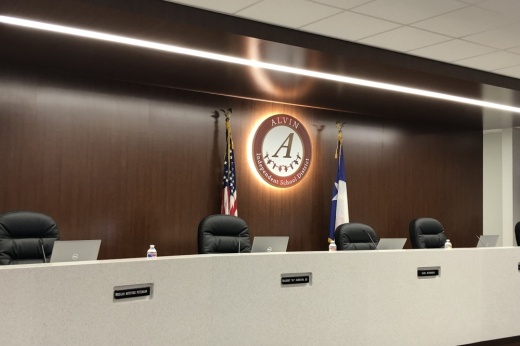Deputy Superintendent of Operations Rory Gesch and Alvin ISD Chief of Police Michael Putnal gave a presentation to the AISD board of trustees Aug. 9 to give an update on the district’s progress in boosting school security after the Uvalde school shooting in May.
Putnal said CRASE, or Civilian Response to Active Shooter Events, training is normally provided to AISD staff, but this year the police department will provide the training to the public as well.
“We want to enable everybody to be as safe as possible,” Putnal said.
The public training with AISD police officers will take place Aug. 29 from 6-8 p.m. at Shadow Creek High School and Sept. 6 from 6-8 p.m. at Alvin High School, Putnal said.
The Texas Education Agency released a series of mandates for districts to complete before the start of the 2022-23 school year, including a summer safety audit, a comprehensive exterior door safety audit, the training of all campus staff and the scheduling of mandatory drills for the school year.
“We were already in the process of doing several of these things,” Superintendent Carol Nelson said in regard to the TEA mandates.
Gesch said the external door audit and partial campus safety audit will be turned in to the state in September with a completed safety questionnaire. He said the district conducts tri-annual comprehensive school safety audits, the next of which will occur April 2023.
Gesch said AISD maintenance staff and police staff historically perform daily safety audits on campuses, totaling about 1,900 campus security checks over the course of the 2021-22 school year. These checks include door ajar checks and staff ID checks.
AISDPD officials and local law enforcement are present on all campuses, including multiple officers at each high school, one officer at each junior high, contracted officers and patrol officers at elementary schools, Gesch said. He said all staff members can initiate a lockdown at their campuses through their cell phones.
Putnal said officers train in solo officer engagement, meaning an officer will not wait for additional support to arrive before investigating a concern call or engaging in an emergency. This differs from the state’s Advanced Law Enforcement Rapid Response Training procedure of sending in groups of officers to engage in situations, such as an active shooter incident.
“Because our officers are already on campus, ... if something happens, [they] are expected to immediately respond. We tell them it's a demand: We volunteered for the job; we took an oath; we take it seriously,” Putnal said.





